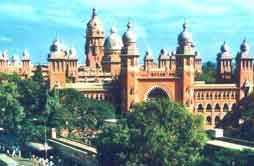High Court of Judicature at Madras

History:
British India's three presidency towns of Madras (Chennai), Bombay (Mumbai), and Calcutta (Kolkata) were each granted a High Court by letters patent dated 26 June 1862.[3] The letters patent were issued by Queen Victoria under the authority of the British parliament's Indian High Courts Act 1861. The three courts remain unique in modern India, having been established under British royal charter; this is in contrast with the country's other high courts, which have been directly established under Indian legislation. However, the Constitution of India recognises the status of the older courts.
The Madras High Court was formed by merging the Supreme Court of Judicature at Madras, and the Sudder Dewanny Adawlut. The Court was required to decide cases in accordance with justice, equity and good conscience. The earliest judges of the High Court included Judges Holloway, Innes and Morgan. The first Indian to sit as a judge of the High Court was Justice T. Muthuswamy Iyer. Other early Indian judges included Justices V. Krishnaswamy Iyer and P. R. Sundaram Iyer.
The Madras High Court was a pioneer in Original Side jurisdiction reform in favour of Indian practitioners as early as the 1870s.
The Madras High Court's history means that the decisions of the British Judicial Committee of the Privy Council are still binding on it, provided that the ratio of a case has not been overruled by the Supreme Court of India.
Although the name of the city was changed from Madras to Chennai in 1996, the Court as an institution did not follow suit, and has remained as the Madras High Court.
Noteworthy:
In the City of Madras, the Civil Courts are constituted under the Madras City Civil Court Act with Principal Judge, Additional Judges, Assistant Judges and a Registrar with administrative functions. Court of Small Causes, Labour Court, Industrial Tribunal, State Transport Appellate Tribunal, Special Court under EC & NDPS Act, Special Court under TNPID Act and Mahalir Neethimandram are also Courts functioning in the city of Chennai. Criminal Courts are constituted with Chief Metropolitan Magistrate and Metropolitan Magistrates.
Bench
With Chief Justice M. Y. Eqbal heading the court, it currently has 53 judges who exercise civil, criminal, writ, testamentary and admiralty jurisdiction. The Madurai Bench has been functioning since 2004.
The vestiges of the colonial High Court continue to characterize the premises till date. In a rare tradition which is today a distinction, Judges of the Madras High Court are still led by orderlies who bear a ceremonial mace made of silver. This is a practice so old and Anglican that most High Courts and even the Supreme Court of India have either not had the practice at all or have abandoned it long back.
Important links
* Madras High Court lawyers Profile
* Madras High Court Legal Aid Clinic
* Madras High Court Forms - Lok Adalat - Form PLLA - Prisoner Form
* Madras High Court Lawyers Directory
* High Court Legal Services Committee Rules 1998
Landmark Judgments | Famous Trials | Historical Facts | Legal Profession
Law Maxims # Acta exteriora iudicant interiora secreta - Outward acts indicate the inward intent
# Boni judicis lites dirimere est - It is the duty of a good judge to prevent litigation
# Conventio et modus vincunt legem - A contract and agreement overcome the law
Damnum sine injuria - damage without legal injury.
Ex facie - On the fact of it.
Faciendum - Something which is to be done.
Injuria non excusat injuriam - A wrong does not excuse a wrong.
How To Submit Your Article:
Follow the Procedure Below To Submit Your Articles
Submit your Article by using our online form
Click here
Note* we only accept Original Articles, we will not accept
Articles Already Published in other websites.
For Further Details Contact:
[email protected]
File Your Copyright - Right Now!
 Online Copyright Registration in India Call us at: 9891244487 / or email at: [email protected] |
Lawyers in India - Search By City |
|||
|
Delhi Chandigarh Allahabad Lucknow Noida Gurgaon Faridabad Jalandhar Vapi |
Mumbai Pune Nagpur Nashik Ahmedabad Surat Indore Agra Jalgaon |
Kolkata Siliguri Durgapur Janjgir Jaipur Ludhiana Dimapur Guwahati Amritsar |
Chennai Jamshedpur Hyderabad Coimbatore Eluru Belgaum Cochin Rajkot Jodhpur |


 Right Away Call us at Ph no: 9650499965
Right Away Call us at Ph no: 9650499965